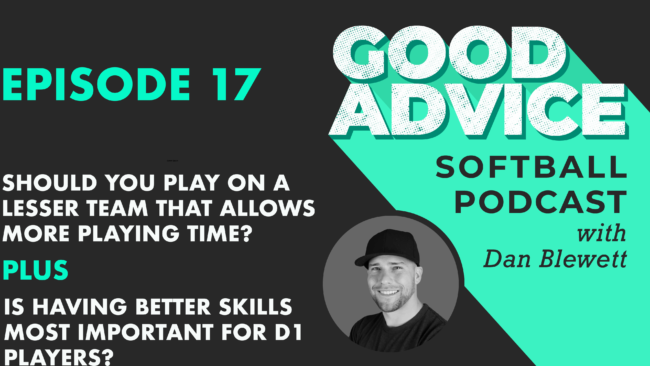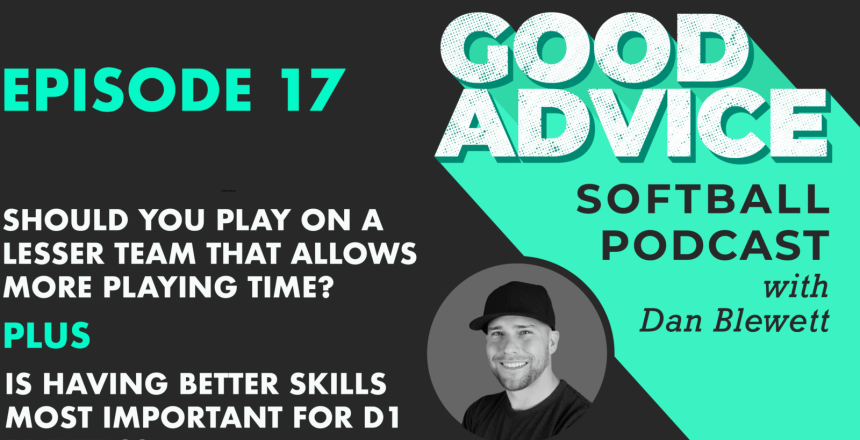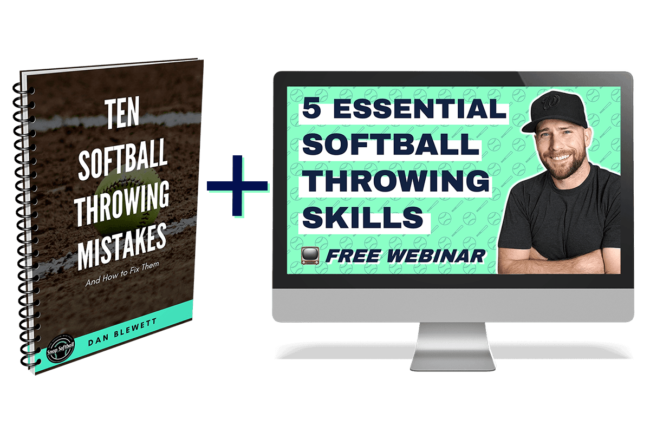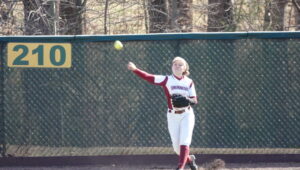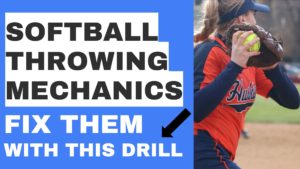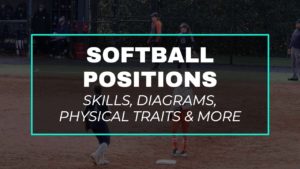*This article may contain product links which pay me a small commission if you make a purchase. Learn more.
Should you play on a lesser team that allows more playing time? Dan gives helpful insight on things to consider when contemplating this question. Dan also discusses other factors that are important for becoming a D1 softball player rather than just having good skills.
Links: Try the Early Work Strength Program for free here.
To submit a question for the Good Questions Q&A segment, make a voice recording and email it to Dan at hello@danblewett.com. Want to support the show? Enroll in one of Coach Dan’s online throwing courses or his mental skills course. Use code GOODADVICE to save 20% on any course, just for being a listener. Sign up for Dan’s Email list and get his free throwing eBook, and follow up with him on the interwebs: YouTube Channel | Twitter | Snapsoftball.com
Podcast: Play in new window | Download
Subscribe: Apple Podcasts | Spotify
Transcript: EP17 – Should You Play on a Lesser Team that Allows More Playing Time? And, Do D1 Players Have Better Skills or are They Just Physically Better Athletes?
You are listening to the Good Advice Softball podcast. I’m Dan Blewett. And on this show, you’ll learn how to help the softball player in your life. Sharpen her skills, improve her mindset and find new confidence through softball.
All right. Welcome back to the Good Advice Softball podcast. I’m Dan Blewett on today’s episode. We’re going to cover two main topics. Number one. Should you play on a lesser team that can allow better playing time. And number two, do D1 players have better skills or are they just physically better athletes?
So, number one, before we get going, I want to mention my new strength and conditioning program for softball players is called Early Work. You can find links in the description or the show notes of this podcast. The program is now live its been launched. It is ready for you to sign up. So if you’re looking for a strength conditioning program that you can do in your commercial gym or at school or with your team or with your, you know, your niece or your nephew.
We offer individual plans, family plans, and team plans. So there’s a great program where if you have a place to train what you don’t want to either spend the money for a strength coach or be in a sports performance facility for COVID reasons or whatever, but you do have access to a gym that you feel comfortable going to.
This is a great program for you. It’s got exercise videos for every exercise. We update the program monthly, it’s got arm care, all this different stuff in it. So it’s a great program and we offer a 14 day free trial. So if you want to give it a shot. There’s no risk and give it a go. All right. So first thing on the docket today, number one, should you play and move to a lesser team to get more playing time?
Now there’s two schools of thought about, about this. So number one, players can’t be the best player on every team they play on. That’s very, very rare. So you have to assess. Do I just need to compete a little harder and put in a little more work and pull myself up to this level. Is that where I’m sort of that like in my, just off of getting the playing time that I want.
And then if I, you know, I let these players push me a little bit and put in the work and I still get great coaching and great practice that this is going to be a situation where I might be able to play more in the future. Then that sounds like maybe you should stick it out. Because here’s the thing you don’t want to go to a team where it becomes way less competitive or way less environmentally, similar to what you want.
So if you’re a very serious player and you’re putting in lots and lots of work and you really want to play the next level, you want to be around players with the same mindset. So you don’t necessarily want to leave a travel team. Where a lot of players have that mindset to go to a team where you can get a lot more playing time, but it’s more like a rec ball atmosphere because those players aren’t going to push you.
The competition is not going to push you as much, and it can be, it can have a very deleterious effects on your overall growth. Like you need people chasing you and pushing you to be better. You know, even Usain Bolt runs a little bit faster when he’s being chased and he’s got a chance to lose, right? So I think it’s important to just assess this and every situation’s different.
And it’s hard to give blanket advice. I gave some blanket advice on Twitter and most people agree. Some people push back, but in general, you want to be. Just, you want to be with at least a core handful of players that are better than you, and you want to be forced to say, okay, if I want to continue to start over some of these other girls in the team that are pretty good.
That I need to be working my butt off, not just at the field, but at home and in practice. That’s the best scenario because you learn a lot from players who were better than you. You obviously there’s always opportunities to play. If someone has a really rough patch or there’s an injury, God forbid.
But if you feel like you do have, you’re getting some playing time, obviously, maybe not in the role that you want. But it is viable and reasonable that you will get playing time. If you continue to improve, et cetera, et cetera, then that team’s probably in the right spot for you. Now, if there’s like an absolute stud shortstop and a stud third basement, a stud second basement and a stud backup infielder, and you’re like number five for middle infield.
And it’s not that reasonable that you’re going to get much playing time at all. And it’s maybe not going to change next year, even if you get better. Cause they’re all getting better too. Then maybe that’s the situation where you want to find a team where you can, you can, alright. I can maybe start at third base.
Maybe I can’t start at short on this other team because they still have a great shortstop, but I’m going to get more reps in. I’m going to get my ground balls and I’m going to get more time. So it just depends. But the big problem today is that parents are just fleeing. If their daughter can’t play, you know, shortstop, it’s like, well, she’s not as good as that shortstop.
She can play third base, like while she’s a shortstop. Well, she’s not, if she’s not able to play there on this team. And the thing to remember is if you want to go D1 and you can’t start on your travel team in the position that you want to go, D1 four, You’re probably not a D1 caliber player. So I think a lot of parents, they have these, this pie in the sky attitude.
Like my daughter’s going to go D1. She needs more reps. Well, if, again, if she’s not starting on in travel ball, she’s not going to be a D1 player. That’s almost. Without a doubt. True. For almost every scenario. There are certainly exceptions once in a while, where it’s like national powerhouse kind of team where it’s like, we’ve got 61 starters and we got a potentially D1 starter sitting on the bench.
That’s pretty rare though. Typically again, if you can’t start at your chosen position on a travel team, then you’re not the player that you maybe think you are. So. I think that’s important to note. But again, like you could definitely find a scenario where you’re a really good catcher, but you’re just behind a stud catcher.
Who’s going to catch almost all the games that does happen. And that’s, it’s realistic to say, all right, I just got to go to some, a team that’s a slightly less good and I can get my reps and I can develop because you don’t develop on the bench. So we do know that, right? So you need to find the balance of.
How good is he, is the coaching. How good is the team overall? How good is the comradery? How good is the culture? How good is your opportunity to play more in the future? And just to really get better? Because again, if you’re really going to ride the pine 80% of the time, And that team’s probably not a good fit for you, but if you’re to the point where it’s like, Hey coach, put me in left field coach what’s me at third base coach puts me at second.
Sometimes like I’m getting my bats. I just wish I could play shortstop more. That might be a team where you stick it out because look put in the work like. You’re getting on the fields so your close, but, you know, I don’t know. Can you out work that player? Can you take her spot if she has a rough couple of weeks, can you get in there and do better and play in that spot?
I mean, there are stories over and over and over where, and, and this was actually Chris Taylor’s the Chris Taylor for the Dodgers recently. They said that he was at University of Virginia. He, I think took, there was like a stud shortstop above him freshman year. And then sophomore year that shorts I’ve got hurt, like hurt his quad or something.
Chris Taylor went in there and then when that kid came back from his injury was healthy. Ready to go again? He didn’t get a spot back. Chris Taylor kept it. So that happens a lot too. You know, you get your chances. Can you. Be opportunistic and make the most of it. So that’s important. And I think the biggest thing is parents has to be really thoughtful about this because what you do not want to do is pave the road for your kid.
If you’re just constantly, we’ll go get a new teams, so you can get a hundred percent playing time. Well, it didn’t get enough playing time here. Well, let’s go get another team so we can get a hundred percent planning time. That’s the wrong, absolutely. The wrong thing to do. It’s absolutely the wrong thing to do.
Your kids need adversity. They’re not going to just become CEO at the new company they start at when they graduate from college. They’re going to start at the bottom. They’re going to have to work their tail off for pretty much everything they get in their life. Except sometimes for youth sports, we know that there’s a lot of coaches that, that just make a new team for their kids and favor their own kid.
You know, just it’s, it’s a team for little Johnny or little Sally. And of course there’s a lot of coaches that don’t do that. There’s a lot of coaches that coach their daughter’s team, their son’s team. And it’s very judicious with playing time and it’s not about their kid. It’s about all the kids and that’s great too.
So it’s never one way or the other. But you just don’t want to pave the road. So it’s nice and smooth for your kid. Let them have to earn things. And so just be thoughtful, but again, if they’re stuck on the bench and there’s just no hope, realistically, not that much hope that they’re going to get significantly more playing time next year.
Just remember that they aren’t going to get better from the bench. So. You do want to make sure they get their reps at least probably half the time and get chances. but also do they need to see those life lessons that Hey, playing time is tied to hard work. So if you don’t get the playing time, you work, you want, are you putting in more extra work to, to get some playing time?
Or are you still doing the same stuff you’ve always been doing? Cause that’s telling as well. All right. So hopefully this conversation is helpful. It can be difficult to figure out when to jump ship and you might be listening to another parent. Who’s like very eager to jump ship and think that it’s a right, the right decision for you too.
But every situation is different, so definitely be thoughtful about it. And don’t just make your decision with only yourself and consideration. Ask other parents, ask other players, you know, ask your daughter to kind of feel around and just try to make an informed decision.
And part two, let’s talk about do D1 players have better skills than. Other players in lower levels. So here’s of the things I want you to think about. So in women’s sports, there’s a lot of opportunity for good athletes to pick a sport that really fits them well. So, I was talking to a friend recently who played lacrosse and field hockey in high school and had the opportunity to play both sports at the D1 level and, and kind of got to pick.
But when you’re a really physical well, bill athletic high schooler, you have a lot of opportunity and you have a lot of opportunity, especially in softball to make up for a slight lack of skills because of how small the field is. And this is obviously the big talking point with throwing. What I would say with D1 players is when they get to that level, they’ve gotten to that level because they have a better swing than almost all their peers, right.
D1 players have to put in a lot of work and they have to have really good softball builds when it comes to their swing. When it comes to their fielding ability, when it comes to things like their catching mechanics, like they’re blocking all that stuff. They’re throwing. And just like the speed of the game in general.
So like running, they can’t be super awkward. Like they’re typically very good athletes in general. So the way they swing, the way they field and the way they move are typically very high level compared to other players. That’s a lot of what makes them D1 players is those softball skills and the work they put in.
But with throwing, this is sort of in a category on its own. Throwing is often the one that physicality makes up for a lack of skills. And again, I’ve seen a lot, a lot of mid tier D1 schools and especially lower than that. Lots of players. Have very subpar throwing mechanics, but their physicality, the fact that they’re just bigger and stronger and more fast Twitch than their peers allows them to still get enough throwing velocity to play at that D1 level.
And that’s just been shown to be true because I’ve watched girls with very poor mechanics that would never fly in baseball because of the size of the field and the speed of the game that they can still get the throw off quickly and get it out and be effective enough. Because the field and the throw is like 45 feet, right?
So it’s a short throw if you’re charging ball at third base. So I think it’s important to recognize the difference in skills and physicality and how much physicality can make up for stuff in the women’s game. In baseball, because the field is so much bigger, you kind of have to have a little bit of more equality as far as your skills and your physicality.
Like you can’t. Muscle the ball from third to first with bad mechanics, it just doesn’t work that way. But in softball you absolutely. So what’s the point of this? So sure. Number one, strength and conditioning still is a big thing. And again, I think more and more girls are doing strength and conditioning, which is really important.
It’s great for their confidence. It’s great for obviously their physicality and their strength and their exit velocity, their throwing velocity, their durability, all those things. So strength conditioning continues to be really, really important for female athletes. And it’s also something that a lower percentage of female athletes do very seriously compared to male athletes today.
And so that means there’s more opportunities to gain on girls by doing it yourself. So then what I mean is, you know, if you took a group of a hundred high school baseball players, maybe like 90 of them lift weights, like semi seriously. And that’s just a number I made up. But if you like the girls a hundred girls, maybe it’s only like 60 lift weights semi seriously.
And so you have a group of 40 who don’t, who the 60 are going to gain a lot of ground on they’re going to really pull away from. So it’s just something to, to remember. And as far as like the physicality goes. There are obviously some naturally just great athletes. Like they just grow up, they’re bigger and stronger.
Like they look like a 17 year old when they’re 14, that’s a big part of going D1. And just going to playing at the next level in general, just being physically developed faster than your peers, but the strength training aspect also speeds that along, but still, I think more of more of the physicality can make up for a lack of skills and softball, but you still absolutely need to have really.
Really strong softball skills. So that means putting in tons of hours in the cage, that means putting tons of hours pitching, which softball pitchers are probably some of the most dedicated to their craft of anyone. I’m always impressed by how often softball pitchers are practicing. It’s just over and over and over.
Cause they can throw more than the boys can. But just like the focus of their sessions, I think there’s something really unique and special about softball pitchers, from what I’ve seen over the years, that they just really tend to love their craft and put a lot of their, their energy and really enjoy practicing it.
So I think all those things are really, really important. But again, I think as parents, you really need to look at your daughters and the players on your team and look at them from the college coaches eyes and say, Does she look like a girl or does she look like a strong woman and strong woman is what you want college coaches to see when they look out on that field, they want to see the physicality.
They want to see the athleticism and they want to see the speed and the power bus behind the ball, whether it’s swinging or spraying the bases or making a throw. And so again, the physicality can make up for a lot of deficiencies. So if you don’t have perfect throwing mechanics, but you’re getting pretty big and pretty strong.
That’s going to still add a lot of oomph to that throw where you don’t have to get to. You know, having perfect mechanics necessarily to still play the next level. So physicality can smooth over a lot more things in softball. Then again, by comparison and baseball, which I just compare the two because I’m so familiar with both.
And I think it’s fascinating to see the differences in the two sports in the way players are recruited, et cetera, et cetera. So again, takeaway here is. Don’t forget physicality. And that comes from the whole family. I mean, one of the big challenges with young athletes is they’re so busy with school, with their social lives, with, with their sports, all the afterschool stuff.
Of course today it’s like after zoom stuff. But the thing that most kids lack is the ability to prepare their own food. Well, they don’t eat well unless mom and dad are really helping them. With nutrition and, and planning meals and planning, extra food. And a lot of the parents that are, I think, have done a phenomenal job, that I’ve known.
They’re really engaged with their kids about what they’re eating and helping them pack double lunches, like double sized snacks, like. Having them pack tons and tons and tons of food that they’re motivated to eat. That’s a really important part of getting your daughter to the next level. So if she wants to be big and strong and play the next level and have the physicality and put on the muscle and maximize our workouts, she needs to eat like an animal a lot of the time.
And that can be harder because you know, girls are sensitive about their weight and appearance, a little more so than the boys are. But, you know, cooking healthy food and giving them, you know, lots of grabbing gross stuff that her grabbing go stuff that’s healthy, like fruit and nuts and protein bars and good granola bars that aren’t filled with sugar and all that stuff.
It is a challenge to give high schoolers enough food to make it through a really long day at school where they’re just constantly busy and run around and burning lots of calories. And have they. Crazy high metabolism of that age. Right? So it’s a big challenge trying to get them that physicality. And I think it does become a very tribal, like the whole tribe.
The whole family needs to help them get to that goal because if you leave them to their own is to fend for their own food. And, you know, you pack a sandwich or whatever, just grab food at school. They need to be eating semi constantly to really put on weight and to maximize their workouts and to get to that point where by the time they’re a sophomore or a junior.
That they really look physically fit the part of a college softball player. So just something to consider, it takes more than just skills. It takes incredible dedication to building your softball skills, but it does take more than that takes the physicality, the athleticism, because college coaches want to see the durable, you know, future D1 player.
On the field when they’re high school, they want to see them. So yeah, that looks like a, that looks like a future D1, so something to consider as you start to look at your training, cause it’s still only in November, right? And so as you’re trying to figure out the rest of the season or this fall off season leading up into the spring season, Really consider those, that sort of, that, that triad, the skills, the strength conditioning and the nutrition, like how is your family going to help your daughter meet her weight, gain strength, gaining goals through healthy?
Well, that’s all the good advice I’ve got for today. If you enjoy the show and would like to support me while also helping yourself. Enroll today in one of my online softball courses, my She’s Got a Cannon throwing courses, come with pricing plans for any budget. And my Resolute Athlete Mental Skills course will help your daughter or team build the mindset of a champion enroll in any of my courses through the links in the show notes and save 20% code good advice just for being a listener.
Be sure to subscribe to my weekly email list where you’ll get updates on all my new videos and episodes, nearly 4,000 people get my email and you should to sign up for the link in the show notes. Lastly, who do you know, who can use them? Good advice. Please share this podcast with a friend, subscribe on iTunes, Spotify, or wherever you listen to podcasts and subscribe to my.
Snap softball, YouTube channel, where you’ll find this podcast and hundreds of softball, instructional videos. Back when I was a player, I was always thankful for good coaches and good advice. I’m Dan Blewett and I’ll see you next time.

